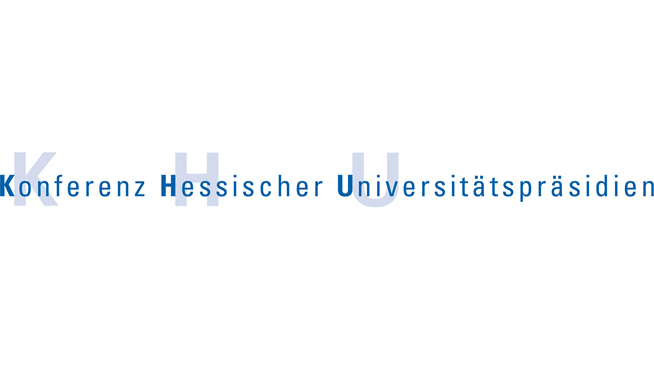This page contains automatically translated content.
Hessens Universitäten brauchen deutliche Verstärkung ihrer Mittel für Forschung und Lehre

Die Ministerpräsidentenkonferenz hatte in ihrer Sitzung am 6. Juni 2019 die Finanzierung des „Zukunftsvertrags Studium und Lehre stärken“ besiegelt. Die grundsätzliche Übereinkunft der Fachministerien zu den drei Pakten über die Forschungs- und Lehrfinanzierung zwischen Bund und Ländern war bereits am 3. Mai erzielt worden. Der „Zukunftsvertrag“ beinhaltet zunächst ab 2021 und dann ab 2024 in einer zweiten Stufe weiter steigende Mittel für Hochschulen und Forschungseinrichtungen in Deutschland.
Mit den daraus zusätzlich zur Verfügung stehenden Mitteln gebe es auch in den laufenden Verhandlungen zum Hessischen Hochschulpakt planbare Spielräume für die hessischen Universitäten, die einen erheblichen Nachholbedarf haben, sagte die Sprecherin der Konferenz Hessischer Universitätspräsidien (KHU), Prof. Dr. Birgitta Wolff, Präsidentin der Goethe-Universität Frankfurt. Wolff begrüßte die Entscheidung der Ministerpräsidenten: „Nach der grundsätzlichen Einigung von Anfang Mai ist damit eine wichtige Hürde für mehr Planungssicherheit in der Hochschulfinanzierung überwunden.“ In der KHU haben sich die Präsidien der fünf hessischen Universitäten zusammengeschlossen, darunter der Universität Kassel.
Diese Verbesserungen seien aus Sicht der KHU dringend geboten. Zahlen des Statistischen Bundesamtes belegen den Nachholbedarf: Die Universitäten sind weiterhin das Rückgrat des hessischen Wissenschaftssystems. Von knapp 224.000 an öffentlichen hessischen Hochschulen zum Wintersemester 2017/18 eingeschriebenen Studierenden waren 152.500 an den Universitäten eingeschrieben. Die Universitäten schultern damit nach den hohen Steigerungen der letzten zehn Jahre weiterhin den Löwenanteil der hochschulischen Lehrleistungen in Hessen, jedoch mit stark unterproportionalen Aufwüchsen bei den Professuren. Insgesamt sind die professoralen Betreuungsrelationen für die Studierenden die zweitschlechtesten im Vergleich der Bundesländer. Zwischen 2013 und 2017 ist die Zahl der Professuren an hessischen Universitäten nur um etwa 1 Prozent gestiegen, mit der Folge, dass heute eine Professur im Durchschnitt 77 Studierende betreut. Daraus ergibt sich für die einzelne Universitätsprofessur ein stark gestiegener Zeitaufwand in der Lehre – immer mehr auf Kosten der Forschung.
Inflationsbereinigt ist die Finanzierung von Studienplätzen an hessischen Universitäten aus den regulären Landesmitteln und den Mitteln des Hochschulpakts 2020 deutlich geschrumpft: Standen 2010 noch 8.912 Euro pro Studienplatz zur Verfügung, so waren es 2017 nur noch 7.711 Euro, ein deutliches Minus von 13 Prozent.
Mit insgesamt mehr als 480 Mio. Euro (2017) werben die Universitäten 95 Prozent der Drittmittel aller hessischen Hochschulen ein. Diese Mittel finanzieren national und international wettbewerbsfähige Forschung. Zwischen 2013 und 2017 konnten die jährlichen Drittmittel der hessischen Universitäten um über 70 Mio. Euro gesteigert werden – ein Plus, das Hessen als Forschungsstandort unmittelbar zugutekommt. Die hessischen Universitäten stecken damit allerdings im sogenannten „Drittmittel-Hamsterrad“: Ein zunehmender Teil der Arbeitskapazität wird in das Einwerben, Managen und Nachweisen des Drittmitteleinsatzes investiert. Zudem kann das in Drittmittelprojekten beschäftigte Personal in aller Regel nur befristet angestellt werden.
KHU-Sprecherin Wolff: „Die hessischen Universitäten haben heute zum Teil 40 Prozent mehr Studierende als noch vor zehn Jahren. Sie haben diesen Aufwuchs trotz ungünstiger finanzieller Bedingungen mit zusätzlichem Engagement des Personals, hoher Kreativität und vor allem über eine starke Steigerung der Drittmittel kompensiert. Unter dieser Situation hat nicht primär die Lehre für die Studierenden gelitten, wie Befragungen von Studierenden zeigen, sondern die Forschung. Wenn Hessen in der Forschung weiter nationale und internationale Akzente setzen will, muss die Landesregierung jetzt geeignete Maßnahmen ergreifen. Unsere Forschenden brauchen wieder mehr Freiräume für exzellente Forschung! In der nächsten Hochschulpaktperiode benötigen wir deshalb eine deutlich verbesserte und dauerhaft gesicherte universitäre Finanzierung, die sich auch in einer deutlichen Verbesserung der Betreuungsrelationen zeigen muss.“